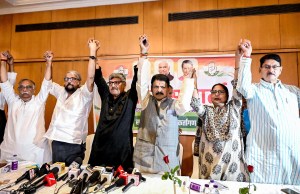Shy Chandra slams criticism, confirms writer as shoemaker
PUNE, July 12: He slams the door against Indian criticism, loves complicated characters, prefers to detach himself from success or defeat - ...

PUNE, July 12: He slams the door against Indian criticism, loves complicated characters, prefers to detach himself from success or defeat – never mind if he beat Booker-prize winner Arundhati Roy to bag the Commonwealth Writers’ prize – but refreshingly wonders why the craft of creative writing cannot be learnt and taught…
A trifle shy, but decidedly forthcoming, award-winning novelist Vikram Chandra, who divides his time between Mumbai and Washington DC, and literally worships the ground British author Anthony Trollope walks on – avers that a writer is like a shoemaker.
While the 37-year-old novelist would have preferred dark, gloomy and horrific surroundings for reading aloud a `ghost’ story, Sunday morning’s brightness forced him to give up the idea, he laughingly said reading instead a few pages from his book Love and Longing in Bombay which won the Commonwealth Writers Prize. The book-reading function was organised at a book store today.
Chandra, who admits that `hunger’ made him a computer consultant during his student days in New York, draws inspiration by simply wandering around the city, observing people and stores up the images which later pop up while writing. After an half-an-hour reading of the story Shakti which deals with two feuding business families from his novel Love and Longing in Bombay, the author answered queries ranging from his favourite novelists to violence in Washington DC and his `filmy’ background.
Chandra who loves comedies of social manners and was inspired to write ghost stories whenever he passed by Bandra’s `bhoot bangla‘ however wonders why the act of writing should be treated so differently say from an act of painting. Why should it be so much more ethereal, he queried arguing that when you can teach somebody how to act and paint, why not in the case of creative writing?
Teaching a creative writing course at the George Washington University then is most natural for Chandra who discusses with a bunch of students which character works and why the dialogue was so clumsy. “Sure they can’t make you an artist, but a close reading of the elements of the craft will help you on what your are working,” he insists.
The writer in him admires Amitav Ghosh, Arundhati Roy, Salman Rushdie and is into `Madame Bovary’ these days, pens his thoughts primarily with sisters, mother and friends in mind. Poetry, nope, not his forte, as he muses that his narratives need space. So much so that he is critical of the distance between author and reader and finds it particularly annoying when the modern writer is thought of as a mysterious prophet like figure. No wonder then he encourages the concept of story-telling specially when the one can listen to the author’s voice.
The novelist who feels safe in Mumbai but prefers to call it Bombay is also saddened at the increasing polarisation between Bombay and Mumbai and the politics of the city which is more violent today. Ask him about the prizes he won for his novels and without batting an eyelid, Chandra quips, “Modern media makes everything like a competition. It’s pleasing when it happens, but I’m not writing for it.”
Critics love to love a first book and hate the second book. Criticism here is more about critics’ politics, he grimaces. So, it’s best to detach yourself from either a sense of success or defeat, he shrugs.



- 01
- 02
- 03
- 04
- 05




























